- Home
- Emile Gaboriau
A Thousand Francs Reward; and, Military Sketches Page 3
A Thousand Francs Reward; and, Military Sketches Read online
Page 3
To-day the zouave is the most popular of all our soldiers; his _chachia_threatens to pass down to posterity with the towering bear-skin cap wornby the grenadiers of the First Empire.
It is to the zouave that we owe the words of the celebrated march knownas the "Casquette." This is the origin of it:
One night the French camp was surprised by Arabs. A murderous fire soastonished our soldiers, that they almost wavered at first; but MarshalBugeaud rushed from his tent, and his presence inspiring our troops withtheir wonted enthusiasm, the enemy was repulsed.
When the conflict was ended, the marshal noticed that every one smiledon looking at him. He raised his hands to his head. In his haste, he hadleft his tent adorned with the anything but heroic head-gear of the Kingof Yvetot; in short, a night-cap.
The next day, when the trumpets gave the signal for the troops to resumetheir march, the zouaves, in memory of that original coifiure, sung indeafening chorus:
"As-tu vu La casquette La casquette, As-tu vu La casquette, Du Pere Bugeaud?"
Two or three days afterward, the marshal, on giving the order fordeparture, said to the trumpeters: "Boys, sound _la casquette_."
So this name still clings to the order. To how many victories it hasled, and will lead the zouaves!
Father Bugeaud's _casquette_, by insuring the success of "Duc Job,"yielded eighty thousand francs to the Theatre Francais, and sixtythousand francs to M. Leon Laya.
It is a night-cap well worth the having.
THE FANTASSIN, OR FOOT-SOLDIER.
The fantassin, _par excellence_, is a soldier of the regular infantry.The cavalry pretend that the foot-soldier wears spurs on his elbows,but this is only a stale joke perpetrated before the bayonet came intogeneral use.
The regular infantry is really the French army. It has shed its bloodupon every battle-field, and has come off victorious again and again.It is the infantry that has carried the standards of France throughconquered Europe. It is the regular infantry which, without shoes,provisions, or artillery, swept down from the Alps upon Italy. It isthe infantry that fought at the Pyramids, at Eylau and at Moscow. Theinfantry is the queen of battles; with her one can go in any directionand always maintain one's position.
There is nothing brilliant about the infantry uniform, and yet whenseen in masses it produces an excellent effect. It is also the mostcomfortable and the best adapted to all the needs of a soldier in thefield.
At reviews, upon the parade ground, and on the boulevards there are,perhaps, regiments that attract more attention; but such is not the caseif it is seen in line of battle. One should see it maneuvering underfire with the same precision as on the Champs de Mars. Each regiment hasbecome a corps, with its officers at its head. A cannon-ball cuts downan entire file. "Close up the ranks!" The ranks are closed; the void isfilled without haste, disorder, or confusion.
Nothing could be more beautiful, nothing could be more magnificent thana regiment of the line advancing for a bayonet charge upon the enemy.Search the ranks; examine one by one these soldiers blackened withpowder, try to find the foot-soldier you have seen lounging about theshop windows in large cities, with his shako on the back of his head.The lounger of yesterday is the hero of to-day. Now, danger illuminesevery face; courage, like an aureole, shines resplendent on every brow.All honor to the regulars! upon their banners is written our glorioushistory!
The foot-soldier in garrison bears no resemblance whatever to thehero of the battle-field. He does not even remember his exploits ofyesterday; he little suspects the great deeds he will perform to-morrowshould France have need of his devotion and courage.
The foot-soldier in garrison is the best and most inoffensive of men,always trying to make himself useful, ever ready to do a favor. Histastes are simple, and his desires modest; boisterous amusements have noattractions for him, and he rarely indulges in the bottle.
The foot-soldier, like all the members of his profession, is generallyin straitened circumstances.
"For in France as in Austria The soldier is not rich, Every one knows that."
It is true that one can not indulge in much extravagance on fivecentimes a day. Fortunately there are ways to increase this meagerincome. In many regiments, the soldiers are allowed to find occupationin the city, provided, of course, that discipline does not sufferthereby. Those who have a trade devote all their leisure time to it;those who have only their two hands and their good-will--and they areby far the largest number--nevertheless find a way to make themselvesuseful. In some _bourgeoisie_ households they hire a soldier to takecare of the garden and scrub the floors.
There is also another source of revenue which, though not the mosthonorable, is certainly the most in vogue; this is playing a trick onone's family.
The fraud is generally suggested by some old grumbler who is an adept inthe art of deception. A mischievously inclined volunteer, who is a goodpenman, generally writes the letter. Illness is the usual pretext. It isthe simplest of all, and seldom fails to produce the desired effect.How can you suppose that parents will refuse to forward a few francs onreceiving from their child a letter beginning thus:
"Dear Mother,--The object of this letter is to inform you that I am inthe hospital."
The family send money. A letter arrives, inclosing a post-office order.The vaguemestre quickly changes it into shining coin. But alas! thismoney vanishes like a dream. And how could it be otherwise? So manyfriends must have a share of this windfall. First, there is thebedfellow, then the inventor of the trick, then the writer, then twoor three comrades, fellow-countrymen--then a corporal who has beenobliging, and many others. Besides, it is not considered seemly for atrooper to spend his money alone.
A soldier who goes out alone, and who drinks alone, is disgraced in theeyes of his comrades.
When he has finished his daily task at the barracks, polished hisweapons, and answered to his name at roll-call, the foot-soldier is atliberty, provided he is not on duty, or on guard, or on the _corvee_,or undergoing punishment, and he can leave the barracks if hechooses. Generally he is eager to improve the opportunity. There must besomething of importance to detain him if he does not go out; a letter towrite, some little job to do, a pipe of unusual length to color foran officer who is making a collection. But such instances are rare. Heloves long walks. If he is stationed in a small town, you can alwaysmeet him in the shady paths in the suburbs. He is generally cuttinglittle switches to beat his clothing.
If he is in a large city, he has a variety of amusements. He delightsin gazing into the shop-windows; he haunts the promenades and the publicgardens; mountebanks always find in him a patient and appreciativepatron, ever ready to laugh at their stale jokes. The mountebank andthe fantassin have had a mutual understanding for a long time. "Walk in.Walk in, gentlemen and ladies. Admission is ten centimes; two sous. Themilitary only half-price."
But there is no place like Paris for the soldier. Wine is a trifle dear;but how many diversions there are. This is a city! one can stroll aboutfive hours without danger of seeing the same objects. Moreover, Pariscontains the Jardin des Plantes, and the Jardin des Plantes is, as everyone knows, the soldier's earthly Paradise.
There, he can spend his hours of liberty most delightfully. He visits,in succession, all the cabinets of natural history. He almost splitshis sides laughing as he stands before the monkey's palace, watching thepranks of its occupants; he goes into ecstasies over the wild animals,and shudders while contemplating the reptiles. But his favorites are thebear and the elephant. He never leaves the Jardin des Plantes until hehas seen Martin climb the tree, and given the elephant a crust of bread,held in reserve in his cap--for want of pantaloon pockets.
But the foot-soldier would be a body without a soul, if he had nocountrywoman. The payse, as he styles her, has been created for thefantassin, as the fantassin has been created for the payse. They loveand understand each other. He accompanies the payse, who is usually achild's nurse, in her walks; he assists her in watc
hing the children,when he does not prevent her from watching them; on the promenade, thefantassin seats himself near the payse and pours sweet nothings into herears, while the children play on the gravel-walk. "Honi soit qui mal ypense!"
In spite of the fatigue that results from it, the foot-soldier lovesa change of garrison. He goes cheerfully from one end of France to theother, singing as he plods along. Every day, before two o'clock, hislegs fail him, which does not prevent him from strolling around to seethe curiosities of the neighborhood as soon as he reaches the town wherehe is to spend the night.
The _billet_ troubles the soldier a little. It is like a ticket ina lottery. Some are very good, some are bad. As a general thing, thesoldier is cordially received; though the contrary happens sometimes. Sofar as the fantassin is concerned, he hardly ever abuses the hospitalityaccorded him. The _billet_ is considered very good when the people ofthe house invite the soldier to share their dinner. It is a saving oftime and of money for him. The fantassin is overjoyed, and to repay hisentertainers, he tells them his history.
When his term of service expires and he returns to his fireside, thesoldier does not presume upon his superiority. He talks freely butnot boastingly of his travels and campaigns. He always finds attentiveauditors, for we all love and respect the old defenders of France.
Some accuse the fantassin of being too unsophisticated; there areoccasions when simplicity of speech is the height of eloquence.
"What were you doing at Solferino?" some one once asked a soldier.
"I?--I was doing like the rest--killing and being killed," he repliedmodestly.
Sublimely artless speech in which is summed up all the philosophy ofwar.
THE SOLDIER OF THE LIGHT INFANTRY;
OR, THE CHASSEUR.
He does not walk; he runs; he is truly the soldier of his age--an age ofsteam. He comes from Vincennes to Paris in thirty-five minutes; it takesa first class _fiacre_ just twice as long.
The light infantry has given abundant proofs of courage. It was inAfrica, in 1842, that it received the baptism of fire, a gloriousbaptism.
From the very first the chasseurs inspired the Arabs with unconquerableterror. It is true that everything combines to give them a frightfulappearance in battle; their somber costume, their strange evolutions,the shrill sound of their trumpets, make them resemble, seen in themidst of the smoke, a legion of unchained devils.
When the Arabs saw them advancing on the run they took flight.
The chasseurs have a terrible weapon. Their rifles, which are loadedwith oblong balls, pierce a board fifty millimeters in thickness at adistance of more than a quarter of a mile; and as all the chasseurs areexcellent marksmen, they make frightful havoc in the enemy's ranks.
It is amusing to see the profound astonishment of the Arabs wounded atsuch a distance. They believe there is some witchcraft about it.
At Sebastopol, the corps of volunteer sharp-shooters was recruited fromthe ranks of the chasseurs. Creeping along, hiding in the slightestfurrow of ground, they generally succeed in approaching within rangeof the battery, and then woe to its defenders! The cannons were soonreduced to silence.
It is impossible for any one who has not witnessed the maneuvers ofthe light infantry to have any conception of the marvels resulting fromdiscipline and daily practice.
Their ordinary gait is a rapid walk, their accelerated pace is the speedof a race-horse. At a blast from the trumpet they disperse in everydirection, disappearing, kneeling, lying flat on their bellies oron their backs, loading their rifles, aiming and firing in everyconceivable posture. Another signal is heard; instantly they are in theranks, crowded close together, bayonets glittering, ready to charge.
And an impetuous charge by the chasseurs of Vincennes is irresistible.Dense as the mass may be upon which they precipitate themselves, theycut their way through it with their broad saber-bayonets, leaving abloody trail behind them.
"They are demons!" Prince Mentchikoff exclaimed at Sebastopol.
The chasseurs are very proud of their reputation for swiftness. Oncewhen an order of the day was read to them beginning thus:
"Soldiers: we are about to march upon the enemy."--they cried: "Oh, no,that does not suit us, we wish to run."
When off duty the chasseur preserves his rapid pace, and his ferocious,almost tigerish manner. His hat is always cocked defiantly on one sideof his head, and his belt is always inordinately tight.
Quick and supple in every movement, he adores dancing. It is his_forte_, and in it he wins a success that the Parisian fireman alone candispute with him. Naturally, the belles adore this perfect dancer; butthey should not trust him--the chasseur is even more inconstant thanthat heartless butterfly, the voltigeur.
In Paris he haunts the shades of Vincennes and Saint Maude. Monday,Thursday, and Sunday he can always be found at the public balls, nearthe Barriere du Trone, happy if permission to be absent until midnightenables him to remain until the close of the festivities. He invariablyfinds a brother chasseur who is also absent on leave, and who sharesseveral bottles of sour wine with him.
*******
But it would be unjust not to say a word concerning the trumpeter of thechasseurs.
How the chasseur, laden with his knapsack, rations, weapons, ammunition,and accouterments can run without losing his breath completely, it isdifficult to comprehend.
But how does the trumpeter, as he runs with the others, find breath toblow his trumpet?
That is something one can not comprehend.

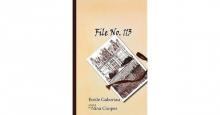 Le dossier no. 113. English
Le dossier no. 113. English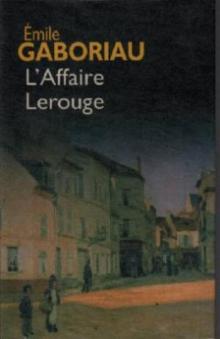 L'affaire Lerouge. English
L'affaire Lerouge. English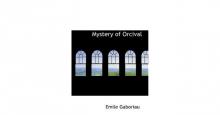 Le crime d'Orcival. English
Le crime d'Orcival. English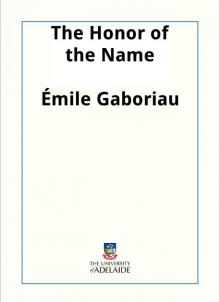 The Honor of the Name
The Honor of the Name The Count's Millions
The Count's Millions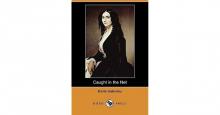 Caught in the Net
Caught in the Net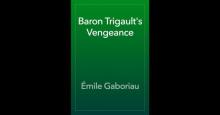 Baron Trigault's Vengeance
Baron Trigault's Vengeance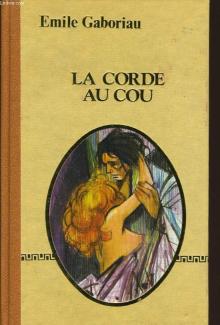 La clique dorée. English
La clique dorée. English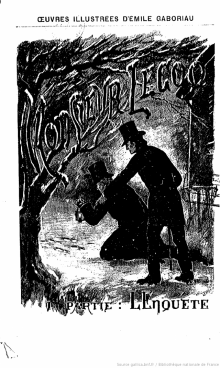 Monsieur Lecoq, v. 1
Monsieur Lecoq, v. 1 Within an Inch of His Life
Within an Inch of His Life Other People's Money
Other People's Money A Thousand Francs Reward; and, Military Sketches
A Thousand Francs Reward; and, Military Sketches